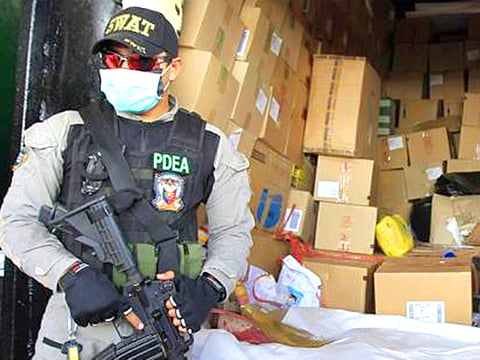Philippine police to reactivate controversial anti-drugs drive
Authorities to use bodycams, countermeasures, to ensure transparency

Manila: Philippine National Police Director General Roland Dela Rosa has announced that he is reactivating a controversial anti-drugs drive that drew condemnation from human rights groups due to alleged abuses by operatives.
Addressing a ceremony to mark the 27th founding anniversary of the Philippine National Police (PNP) on Monday, Dela Rosa said authorities would be launching anew Project “Double Barrel” but with respect for human rights high on the list of operational priorities.
“Project Double Barrel, with all the accomplishments under its name, is back in business — including the Oplan (Operations Plan) Tokhang that has so far brought back 1.3 million people from life of drugs to life of hope,” Dela Rosa said at the national police headquarters Camp Crame in suburban Quezon City.
He added that along with the revitalised Double Barrel and Tokhang, the PNP will be adopting countermeasures to avoid abuses that had dogged the President Rodrigo Duterte-ordered anti-drugs drive campaign in the past.
Dela Rosa said that the PNP has issued new guidelines for carrying out the nationwide anti-drugs campaign.
“These supplemental guidelines are essentially founded on the fundamental principles of respect for human rights and strict adherence to the rule of law, with greater emphasis on transparency, accountability and command responsibility,” he added.
Operation Double Barrel/Tokhang was suspended several months ago by Duterte due to mounting complaints of abuses, including summary executions, torture and extrajudicial killings, allegedly committed by policeman taking part in operations. As a result of criticisms, the president had turned over all operations related to addiction and substance abuse to the Philippine Drug Enforcement Agency (PDEA).
But PDEA, being a relatively newly created government law enforcement arm, was short of manpower needed to carry out a nationwide campaign.
Dela Rosa said that this time around, anti-drug operations by the police would be carried out with the involvement of community members and media representatives. Body cameras would be worn by the operatives during the operations.
“I express optimism that this time, police interdiction operations against illegal drugs will be carried out with greater efficiency, and with less violent confrontations between law enforcers and offenders,” he said.
The New York-based Human Rights Watch had accused the Duterte administration of carrying out a systematic elimination of drug offenders through executions. It said that in an 18-month period since Duterte took over, 12,000 people were killed.
“In September at the United Nations General Assembly in New York, Philippine Foreign Affairs Secretary Allan Peter Cayetano declared the ‘drug war’ a necessary instrument to preserve and protect the human rights of all Filipinos and was never an instrument to violate human rights. That false declaration added insult to injury for family members of the anti-drug campaign’s victims, including children,” Phelim Kline, Deputy Director, Asia Division of Human Rights Watch said.
Cayetano in turn, accused Human Rights Watch of “deliberately been misleading the international community by making it appear that the Philippines has become the Wild, Wild West of Asia where we just kill people left and right.”



